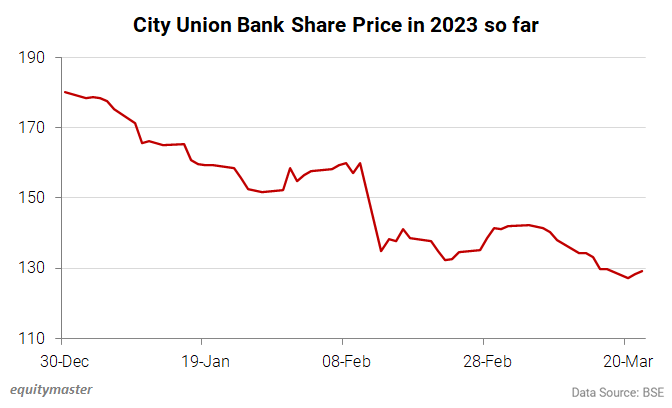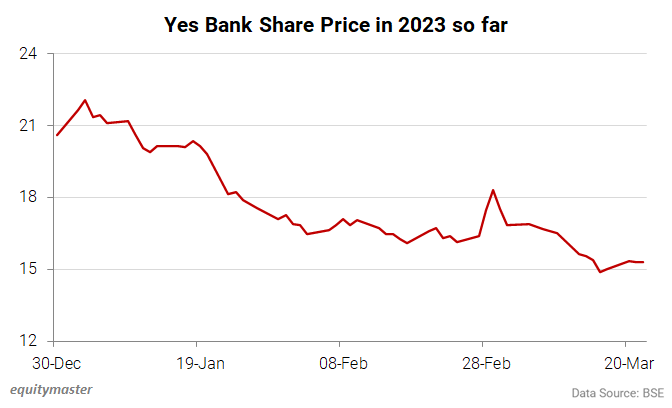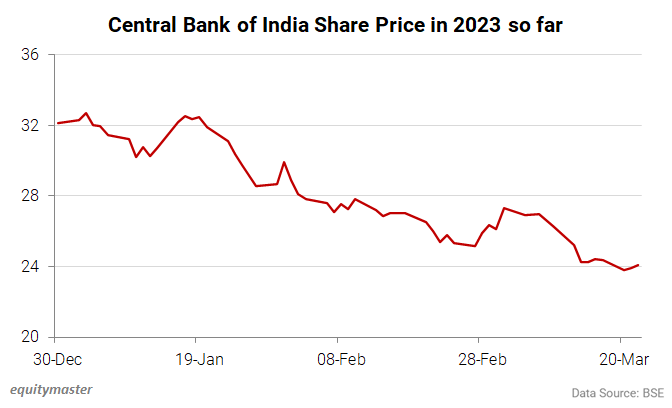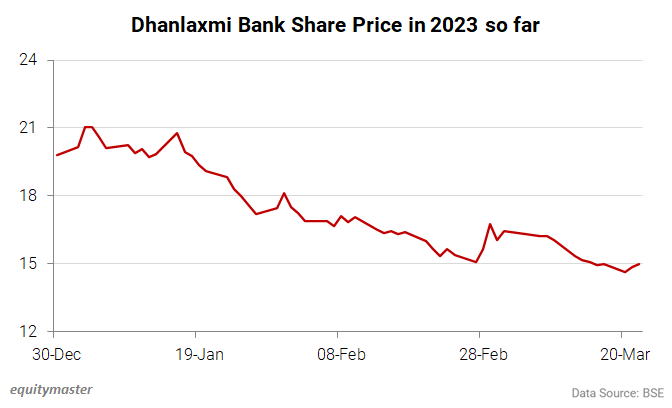- Home
- Views On News
- Mar 22, 2023 - India's Worst Performing Banking Stocks of 2023 So Far
India's Worst Performing Banking Stocks of 2023 So Far

Have you ever considered the sense of loss and devastation that comes with losing a cherished possession? Imagine the distress of waking up to find that your once luxurious bungalow has been reduced to ashes by an unexpected fire.
Such a calamity can be overwhelming, leaving you feeling helpless and heartbroken. The loss of a property that you have cherished for a long time is indeed a traumatic experience that can have a profound impact on one's emotional state.
Investors and customers of the Silicon Valley Bank (SVB) went through a similar feeling on 10 March 2023, as the 40-year-old bank collapsed in less than 72 hours.
The SVB collapse was followed by the collapse of Signature Bank. Then came the concerns related to the Credit Suisse crisis.
As things are now, officials have stepped in to make sure these events don't end up in a sharp market correction. The US bank deposits have been insured. And Credit Suisse has been pushed into the embrace of its Swiss rival UBS bank.
As a result of all this, Indian share markets too witnessed a fall initially as investors were worried that the biggest US bank failure in nearly 15 years might have ripple effects around the world.
After having a dream run in 2022, Indian banking stocks are under pressure in 2023. The volatility in banking stocks began with the Adani-Hindenburg saga, followed by the global banking crisis.
Let's take a look at India's worst performing banks in 2023 so far.
#1 City Union Bank
City Union Bank is one of the leading scheduled commercial banks in the private sector with a major presence in urban semi-urban and rural centres in South India.
It is headquartered in Kumbakonam, Tamil Nadu. The bank was initially named Kumbakonam Bank and was incorporated on 31 October 1904.
In 2023 so far (between 1 January 2023 and 21 March 2023), the stock has tumbled around 29%.

For the quarter ended 31 December 2022, City Union Bank reported muted quarterly numbers.
For the said quarter its total profit came in at Rs 2,178 million (m), which is 21% lower sequentially.
The bank's net interest income (NII) also fell sequentially while net interest margin (NIM) fell to 3.9%, a 21-basis point cut compared to the September 2022 quarter.
On a YoY basis, profit saw a growth of 11% while operating profit also surged 34.6%.
According to the bank's management, City Union Bank's overall credit growth will likely remain below the guidance range of 15-18%.
Slower loan growth and lower net interest income compared to other banks are the primary factors dragging City Union Bank's underperformance.
To know more, check out City Union Bank's factsheet and quarterly results.
#2 Indian Overseas Bank
Indian Overseas Bank is an Indian public sector bank based in Chennai.
In 2023 so far (between 1 January 2023 and 21 March 2023), the stock has fallen around 28%.

For the quarter ended 31 December 2022, Indian Overseas Bank delivered a satisfactory performance.
During the quarter under review, the bank's NIM for the quarter improved to 3.3% as against 2.4% in the year ago period, helped by a 12 basis points fall in average cost of deposits.
For the said quarter, it reported a total profit of 5,551 m. On a YoY basis, profit is up 23%.
Operating profit of the bank however, remained almost flat at Rs 15,400 m against Rs 14,610 m reported in the year ago period on account of muted treasury earnings.
Deposit growth was slower at merely 4% growth YoY .
To know more about the company, check out Indian Overseas Bank's factsheet and quarterly results.
#3 Yes Bank
Yes Bank is a full-service commercial bank providing a complete range of products and technology-driven digital offerings, catering to retail, MSME as well as corporate clients.
It operates its investment banking, merchant banking and brokerage businesses through Yes Securities, a wholly-owned subsidiary.
Headquartered in Mumbai, it has a Pan-India presence including an IBU at GIFT City and a representative office in Abu Dhabi.
In 2023 so far (between 1 January 2023 and 21 March 2023), Yes Bank has fallen around 26%.

If one thing goes wrong, everything else will...
This is the case with Yes Bank. Lately, Yes Bank investors have been under troublesome waters.
On 20 January 2023, the Bombay high court rejected Yes Bank's decision to write off Rs 84.2 bn of additional tier 1 (AT1) bonds on the illegal move ground.
It wrote off bonds in March 2020 too.
Bondholders were not pleased with these write-offs and took the bank to court. The bondholders petitioned that the administrator did not have the right to write off these bonds after the final reconstruction scheme got notified.
The case went further to the Supreme Court of India, which stayed the Bombay high court's order. It will further hear on the matter on 28 March 2023.
Along with this, the company reported poor quarterly results. On 21 January 2023, the bank reported an 80% YoY decline in its net profit at Rs 520 m for the December 2022 quarter. The decline in the net profit was due to an increase in provisions for ageing bad loans.
Provisions for the quarter increased 125.5% YoY to Rs 84.5 bn.
Also, the three-year lock-in period for private lenders like ICICI Bank, HDFC Bank, IDFC First Bank, Axis Bank, Kotak Mahindra Bank, Federal Bank, etc. ended on 13 March 2023. The end of the lock-in period would mean high volatility in Yes Bank shares as crores of Yes Bank shares are now open for sale by these private banks.
To know more about the company, check out Yes Bank's factsheet and quarterly results.
#4 Central Bank of India
Established in 1911, the Central Bank of India was the first Indian commercial bank which was wholly owned and managed by Indians.
Central Bank of India holds a prominent place among the public sector banks on account of its network of 3,656 branches and 178 extension counters at various centres throughout the length and breadth of the country.
In 2023 so far (between 1 January 2023 and 21 March 2023), the stock has fallen around 26%.

During the December 2022 quarter, Central Bank's net interest income rose 20% YoY to Rs 32,840 m. Other income jumped 94% YoY to Rs 9,190 m from Rs 4,740 m a year ago.
Even the profit numbers were good. On a YoY basis profits are up 63%.
So the fall in Central Bank of India shares could be attributed to the volatility in banking stocks.
To know more about the company, check out the Central Bank of India's factsheet and quarterly results.
#5 Dhanlaxmi Bank
Dhanlaxmi Bank is an Indian private-sector bank headquartered in Thrissur, Kerala. It became a scheduled commercial bank in the year 1977.
Dhanalakshmi Bank has also forayed into both life and non-life insurance segments. For this, it has to tie up with MetLife for life insurance and for non-life it has tied up with Oriental Insurance Company.
The bank also markets mutual fund products and for this, it has tied up with SBI Mutual Fund, Birla Sunlife Mutual Fund and Principal PNB Asset Management Company.
In 2023 so far (between 1 January 2023 and 21 March 2023), Dhanlaxmi Bank shares have already fallen around 25%.

Dhanlaxmi Bank performed well during Q3. It reported a total profit of Rs 217 m for the said quarter. In the corresponding period of the financial year 2021-22, it reported a profit of Rs 20 m.
Its net interest income improved to Rs 3,606 m from Rs 2,650 m reported a year ago.
Selling by FIIs could be the reason the stocks has come under pressure.
To keep up with digitisation trend, Dhanlaxmi Bank has entered into the fintech era for micro-lending, operation management and technology services under priority sector lending by associating with New Street Technologies.
To know more about the company, check out Dhanlaxmi Bank of India's factsheet and quarterly results.
Which other banking stocks are falling in 2023?
Apart from the above, here are other banking stocks that have fallen in 2023 so far.
| Company Name | Closing price as on 21-03-2023 | 2023 Performance so far |
|---|---|---|
| Punjab & Sind Bank | 25.9 | -23.70% |
| Suryoday Small Finance Bank | 94.4 | -22.50% |
| RBL Bank | 141.6 | -21.10% |
| UCO Bank | 24.9 | -21.00% |
| Fino Payments Bank | 201.9 | -20.10% |
| Union Bank Of India | 64.9 | -19.30% |
| Bank Of Maharashtra | 24.9 | -18.30% |
| DCB Bank | 105 | -17.20% |
| Ujjivan Small Finance Bank | 24.3 | -16.40% |
| IndusInd Bank | 1,021.80 | -16.40% |
Investment Takeaway
Investors are worried that the SVB collapse might trigger another financial crisis like the recession of 2008. Fear is mongering globally...but this is not a time to panic.
Tanushree Banerjee, co-head of research at Equitymaster believes that the SVB crisis won't lead to another year of recession. Here's what she wrote about the US banking crisis in one of her editorials...
- But SVB isn't Lehman and 2023 isn't 2008. We probably aren't looking at a systemic financial crisis in the US or in India.
SVB and Adani stocks-led crash are not the last of the crises that Indian stock markets will witness in 2023. There are probably many more in the offing.
The fallout of such crises may be negative for most investors out there.
However a little patience, discipline and diligence could allow you make such opportunities the inflection point for investing goals.
The SVB crisis may be huge, but it won't have a big impact on the Indian banking system. According to reports, the finance ministry and experts have said that the crisis may leave the Indian financial system unscathed.
No doubt, Indian banking stocks have fallen but the fall is far less compared to their global peers. The Indian banking sector is relatively insulated because, unlike SVB bank, the business of Indian banks is distributed quite well geographically and also across various segments.
According to a report by the Economic Times, retail deposits constitute almost 60% of the total deposits. The majority of deposits of the Indian banks are saving deposits, which means that these banks have less exposure to an SVB-like crisis.
This means that even if one particular segment or location were to suffer huge losses the entire banking system would not be impacted because of the proper spread of business.
Also, the Reserve Bank of India (RBI) has put in place strict guidelines which stipulate banks from investing short-term funds in long-term securities. Thereby RBI has taken steps to avoid potential liquidity crises in the banking system.
The impact of global banking crisis can be huge and unpredictable. A retail investor is left with endless questions and worries about how to act during these volatile times.
Now, no one can predict how the market will change, but Richa Agarwal, small-cap analyst at Equitymaster shares her views on how you should approach investing amid these macro events in the below video.
Safe Stocks to Ride India's Lithium Megatrend
Lithium is the new oil. It is the key component of electric batteries.
There is a huge demand for electric batteries coming from the EV industry, large data centres, telecom companies, railways, power grid companies, and many other places.
So, in the coming years and decades, we could possibly see a sharp rally in the stocks of electric battery making companies.
If you're an investor, then you simply cannot ignore this opportunity.
Details of our SEBI Research Analyst registration are mentioned on our website - www.equitymaster.comDisclaimer: This article is for information purposes only. It is not a stock recommendation and should not be treated as such. Learn more about our recommendation services here...
FAQs
Which are the top banking companies in India?
Based on marketcap, these are the top banking companies in India:
- #1 HDFC BANK
- #2 ICICI BANK
- #3 SBI
- #4 KOTAK MAHINDRA BANK
- #5 AXIS BANK
You can see the full list of the banking stocks here.
And for a fundamental analysis of the above companies, check out Equitymaster’s Indian stock screener which has a separate screen for top banking stocks in India.
What are the top gainers and top losers within the banking sector today?
Within the Banking sector, the top gainers were SURYODAY SMALL FINANCE BANK (up 6.5%) and UTKARSH SMALL FINANCE BANK (up 4.3%). On the other hand, SHREE WORSTEX (down 4.9%) and CSB BANK (down 3.3%) were among the top losers.
When should you invest in the banking sector?
Banking stocks are very closely linked to economy as both credit growth and margins are dependent on GDP growth and interest rates. Banks tend to have high non-performing assets (NPAs) when interest rates are high, and economy is underperforming and vice versa.
Therefore, the best time to buy banking stocks is when interest rates start falling as the cost of borrowing for banks goes down immediately while the interest they charge on loans stays high and falls with a lag.
To know more about the sector's past and ongoing performance, have a look at the performance of the NIFTY Bank Index and BSE Bankex Index.
Where can I find a list of banking stocks?
The details of listed banking companies can be found on the NSE and BSE website. For a curated list, you can check out our list of banking stocks.
How should you value banking companies?
Investing in stocks requires careful analysis of financial data to find out a company's true worth. However, an easier way to find out about a company's performance is to look at its financial ratios.
The most commonly ratios for banks are the Net NPA to Advances ratio and Price to Adjusted Book Value ratio, which is the ratio of Price to Book Value adjusted for NPA per share.
Price to Book Value Ratio (P/BV) - It compares a firm's market capitalization to its book value. A high P/BV indicates markets believe the company's assets to be undervalued and vice versa.
To find stocks with favorable P/BV Ratios, check out our list of banking stocks according to their P/BV Ratios


Equitymaster requests your view! Post a comment on "India's Worst Performing Banking Stocks of 2023 So Far". Click here!
Comments are moderated by Equitymaster, in accordance with the Terms of Use, and may not appear
on this article until they have been reviewed and deemed appropriate for posting.
In the meantime, you may want to share this article with your friends!